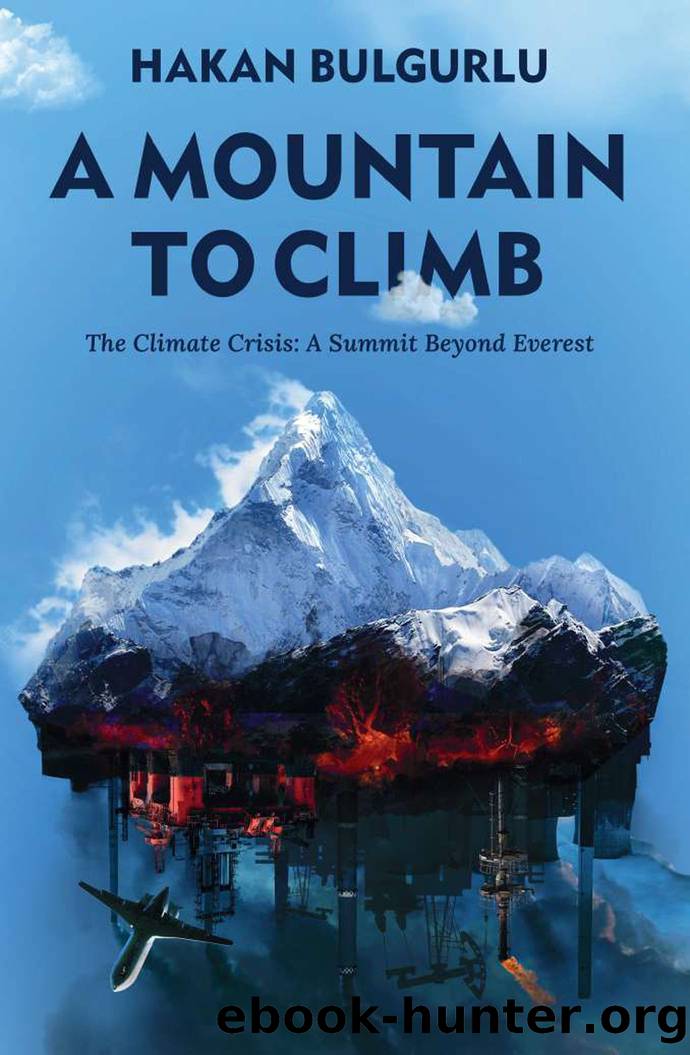A Mountain to Climb by Hakan Bulgurlu

Author:Hakan Bulgurlu [Bulgurlu, Hakan]
Language: eng
Format: epub
Publisher: Whitefox Publishing
Published: 2021-10-15T00:00:00+00:00
FOOD FOR THOUGHT
âThere was once a town in the heart of America where all life seemed to live in harmony with its surroundings.â So begins âA Fable for Tomorrowâ, the opening chapter of one of the most influential environmental books of all time. Its author, Rachel Carson, describes a fictional American town, once rich with nature, but where âa strange blight crept over the area and everything began to change ⦠everywhere was a shadow of death.â
Most ominous was the eerie silence that now cloaked the land: âThe birds ⦠where had they gone? Many people spoke of them, puzzled and disturbed. The feeding stations in the backyards were deserted. The few birds seen anywhere were moribund: they trembled violently and could not fly. It was a spring without voices. On the mornings that had once throbbed with the dawn chorus of robins, catbirds, doves, jays, wrens and scores of other bird voices there was now no sound.â
The American town portrayed in the opening of Silent Spring might not have existed, but all the components and natural disasters Carson had pulled together had occurred in one place or another. She had been inspired to write the book after a letter from a friend in Massachusetts, describing the mass death of birds following the spraying of DDT. DDT was, at the time, the most powerful pesticide in the world. During the Second World War, it had been developed by the Allies and used to rid South Pacific islands of malaria-carrying insects, for which it was extremely effective: the only problem with it was that rather killing the insects specifically, it also obliterated hundreds of different species at the same time.
Meanwhile, on the other side of the war, the Germans had been developing organophosphate nerve agents, so that they could be used as chemical weapons. While that plan never reached fruition, the technology was appropriated by American companies after the war, for use in agriculture in the making of artificial fertiliser. Fresh in American minds was the experience of the 1930s, when the Dust Bowl led to drought, economic misery and the devastation of agricultural lands. With a new array of pesticides and fertiliser at their disposal, and helped by government subsidies to farmers, agriculture flourished. The American food supply was secure, reliable, and, using new methods, producing food that was cheaper for consumers than ever before.
But this abundance came at a cost, as the letter Rachel Carson received in 1958 told. Carson, a bestselling nature writer, decided to investigate. Having failed to persuade any magazine to commission her to write a piece on the subject, she wrote a book about it instead to raise awareness. When it was published in 1962, it was strongly attacked by the chemical industry. Argo-chemical giant Monsanto published âThe Desolate Yearâ, a parody of Carsonâs âA Fable for Tomorrowâ chapter, depicting an America without pesticides: âThe bugs were everywhere. Unseen. Unheard. Unbelievably universal ⦠beneath the ground, beneath the waters, on and in limbs and twigs and stalks, under rocks, inside trees and animals and other insects â and, yes, inside man.
Download
This site does not store any files on its server. We only index and link to content provided by other sites. Please contact the content providers to delete copyright contents if any and email us, we'll remove relevant links or contents immediately.
Man-made Catastrophes and Risk Information Concealment by Dmitry Chernov & Didier Sornette(5980)
The Revenge of Geography: What the Map Tells Us About Coming Conflicts and the Battle Against Fate by Kaplan Robert D(4061)
Zero Waste Home by Bea Johnson(3821)
COSMOS by Carl Sagan(3603)
Good by S. Walden(3534)
In a Sunburned Country by Bill Bryson(3521)
The Fate of Rome: Climate, Disease, and the End of an Empire (The Princeton History of the Ancient World) by Kyle Harper(3045)
A Wilder Time by William E. Glassley(2846)
Camino Island by John Grisham(2787)
Organic Mushroom Farming and Mycoremediation by Tradd Cotter(2672)
The Ogre by Doug Scott(2666)
Human Dynamics Research in Smart and Connected Communities by Shih-Lung Shaw & Daniel Sui(2489)
Energy Myths and Realities by Vaclav Smil(2477)
The Traveler's Gift by Andy Andrews(2445)
9781803241661-PYTHON FOR ARCGIS PRO by Unknown(2354)
Inside the Middle East by Avi Melamed(2340)
Birds of New Guinea by Pratt Thane K.; Beehler Bruce M.; Anderton John C(2242)
A History of Warfare by John Keegan(2224)
And the Band Played On by Randy Shilts(2178)
